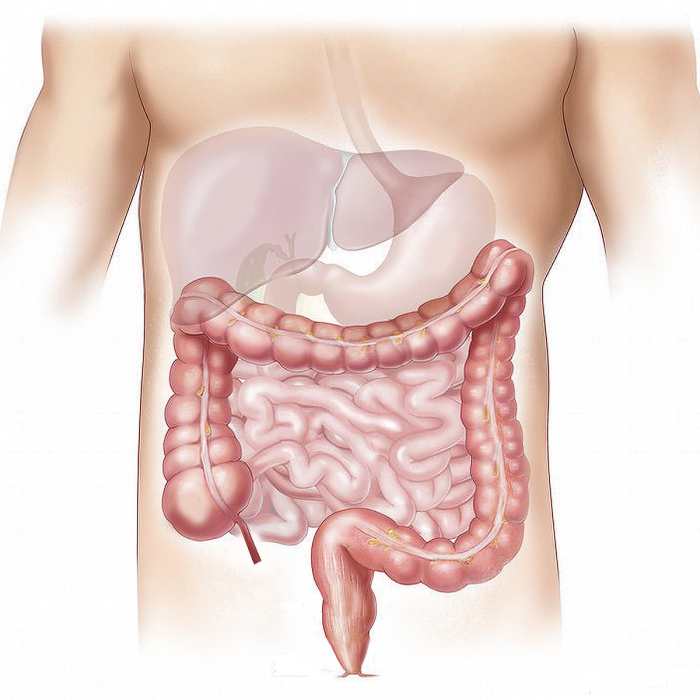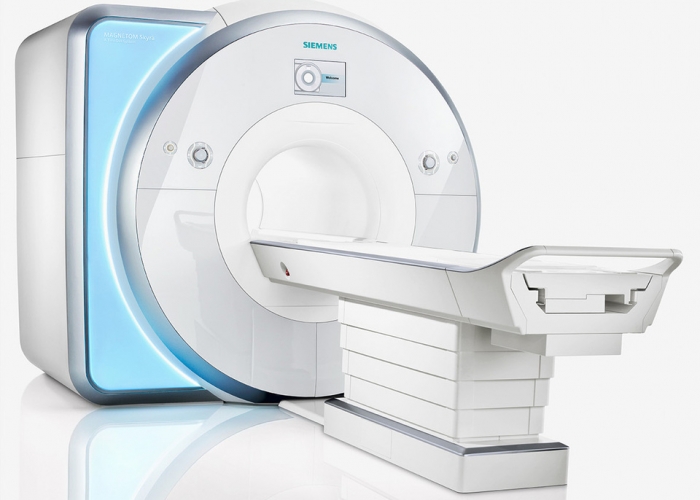Enterography MRI examination
Enterography MRI is essentially used to examine the small intestine and to detect Chron’s disease, and it can also be used to diagnose inflammation, bleeding and tumours in the intestines.
The role of enterography MRI in diagnosis is to detect the thickening of the intestinal wall, to isolate the inflamed areas, and to determine the stage of cancerous lesions.
MRI is an imaging diagnostic procedure that uses magnetic fields to take detailed images of the human body. The magnetic field generated by the device converts the energy changes in the body into a high-resolution, three-dimensional image by a high-performance computer. At Medicover Diagnostic Center, we use equipment that works with a closed but extremely short tube, it is 10 centimetres wider than average, and its diameter is 70 cm, thus helping reduce the feeling of confinement.

What types of diseases does enterography MRI help diagnose?
Enterography MRI scans help diagnose small intestinal diseases. Your doctor may consider an examination if you have the following conditions.
- Chron’s disease
- Progressive systemic sclerosis
- Multiplex peptic ulcer
- Gluten-sensitive enteropathy
- Cancer
In case of which symptoms is it recommended to have the scan performed?
Your doctor may consider an examination if your stools are bloody, your bowel habits have changed or you have complaints of intestinal obstruction and inflammation, or complaints suggestive of cancer.
How to prepare for the enterography MRI examination?
It is recommended that you consult your doctor for details before performing an MRI scan. It is important to know that due to the strong magnetic field, it is forbidden to bring any metal, device or object containing metal into the examination room! This also applies to jewellery, piercings in the body, and certain make-up products. Prior to an examination with contrast agent, specialist consultation is essential. Kidney function laboratory results showing creatinine and urea values are also required to perform this type of scan. Do not eat for 6 hours before the examination.
How is enterography MR performed?
Patients are given about 1.5 litters of fluid 40 minutes before the examination, into which 2 dl of high osmolarity fluid, Macrogol 400, is added to fill the small intestine with fluid, a negative contrast agent, which allows a more accurate assessment of the small intestine.
Prior to the enterography MRI examination, a smooth muscle relaxant is also administered to the patient to reduce peristalsis.
The operator then accompanies you into the examination room, adjusts the appropriate body position, places the coils required for the scan, and then the examination bed lifts you into the magnetic tube. It is important to remain still during the examination, you can only change your body position on the instructions of the operator. The scan takes an average of 50 minutes, while you can communicate with our colleague continuously through the built-in microphone and speaker. The machine makes a loud, rattling sound that can be reduced with the use of earplugs.

When can enterography MRI examination not be performed?
- The examination cannot be performed in the first trimester of pregnancy.
- The examination cannot be performed if you do not have an MRI compatible metal, implant, prosthesis (pacemaker), orthopaedic metal (screw, plate, nail, wire), implanted joint prosthesis, prosthetic limb, implanted defibrillator, neurostimulator, implanted drug dispenser, vascular implants (e.g. clips, vascular occlusion devices), ear implants, metal foreign body (e.g. bullet, splinter, other electronic implants). Therefore, in case of an implant, implanted metal, prosthesis, please bring a written certificate of its compatibility with MRI examination (certified by the implanting specialist, institution) for the examination itself, which clearly states: the suitability to enter the MRI examination room, to perform the MRI examination and marking the maximum magnetic field strength (1.5 Tesla, 3 Tesla) for the device or implant. Inform the person performing the examination about the implant beforehand.
- If the subject weighs more than 200 kilograms, but it also depends on the circumference of the abdomen.
- In case of a scan with contrast agent, if the eGFR of the kidney function is below 45 ml/min, the test is not performed.
What to expect after the examination?
The finding in itself is not a diagnosis. After the examination, please always consult a specialist with the result.
The contrast agent used for MRI examinations is gadolinium-based. In rare cases, hypersensitivity reactions may occur in the form of an allergic reaction after administration of the contrast agent.
When is the result of the enterography MRI examination expected?
The completed recording will be reviewed by the radiologist and the result will be available in our online system after 5 working days.


